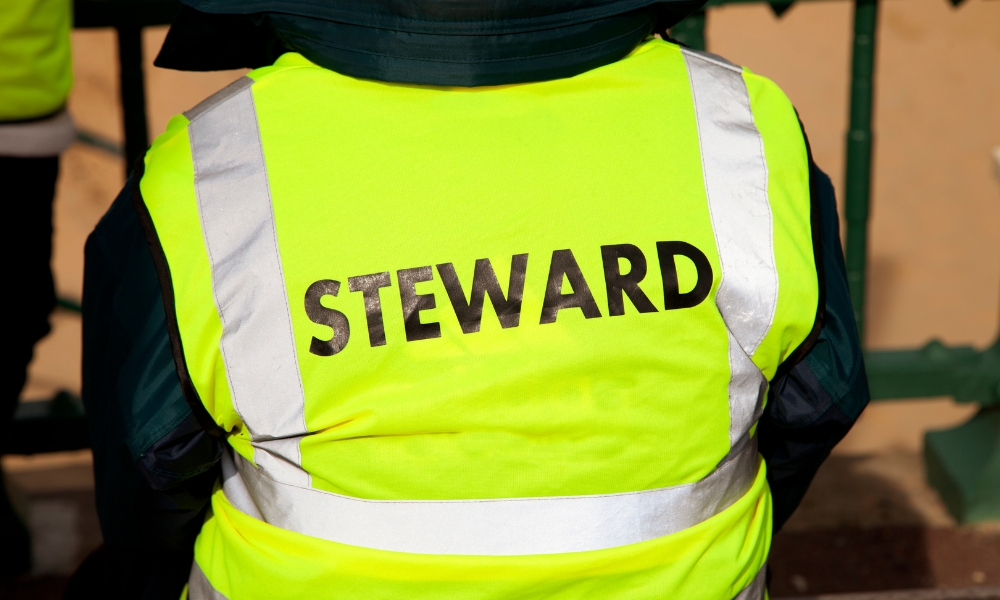Two Brothers Receive 3 Year Banning Orders For Pretending to be Stewards

When Harmless “Jibbing” Becomes a Criminal Offence
Two brothers who posed as football stewards to sneak into a sold-out south coast derby have been banned from attending matches for three years – serving as a reminder of how easily a light-hearted attempt to “jib” into an event can escalate into a criminal conviction and long-term consequences.
Kane and Dale Green were sentenced at Southampton Magistrates’ Court after admitting to fraud by false representation and entering a playing area at a football match, following their attempt to access St Mary’s Stadium disguised as stewards for the Portsmouth versus Southampton fixture in September.
What Happened?
The court heard that the pair, from Portsmouth, arrived at the stadium wearing high-visibility vests marked “steward” and carrying a radio and earpiece.
Their plan was simple – blend in, pass security, and watch the game from a restricted area near the pitch.
However, the club’s genuine stewards and police officers quickly noticed irregularities.
Neither brother was wearing accreditation, and their equipment didn’t match official issue.
They were swiftly challenged, ejected, and later arrested by officers working as part of the stadium’s matchday policing operation.
In court, both men pleaded guilty and were handed Football Banning Orders (FBOs) for three years, along with fines totalling almost £700 each.
The Law: Fraud and Football Offences
While it might sound like a harmless prank or “cheeky blag,” attempting to gain access to a venue by deception is treated seriously in law.
The brothers were convicted under Section 2 of the Fraud Act 2006 – fraud by false representation – which occurs when a person dishonestly makes a false representation with intent to make a gain or cause a loss.
They further offence they also admitted to was going onto a playing area of a football match, an offence under the Football (Offences) Act 1991.
This covers behaviour such as entering restricted zones or disrupting play, even briefly or unintentionally.
Both offences can result in fines, banning orders, and in more serious circumstances, imprisonment.
The combination of these offences also triggered the court’s power to impose the three-year FBO, meaning the men cannot attend any regulated football match in England or Wales – or travel abroad for fixtures involving national teams.
Football Banning Orders: Serious and Far-Reaching
A Football Banning Order (FBO) is one of the most restrictive measures available to courts in football-related cases.
It can prevent attendance at any domestic or international match, require the surrender of passports during tournaments, and allow police to make compliance checks at the individual’s home address.
Breaching an FBO is itself a criminal offence that can carry up to six months in prison.
While some view these orders as a tool against violence and disorder, courts also apply them to acts seen as undermining safety or security at matches – even when no physical harm occurs.
A Cautionary Tale: “Jibbing” as Criminal Offence
For many, sneaking into an event or “jibbing” might seem like a harmless thrill or a way to see a sold-out fixture.
In reality, doing so through deception, impersonation, or by breaching security can easily cross the line into criminal conduct.
The same applies to concerts, festivals, and other ticketed venues where false credentials or security disguises are used.
What begins as a spur-of-the-moment decision can lead to arrest, criminal charges, a permanent record, and exclusion from future events.
Courts increasingly view such incidents through the lens of public safety and integrity of security operations – especially when they involve large crowds or high-profile matches.
In this case, Assistant Chief Constable Tony Rowlinson described the brothers’ actions as a “ridiculous plot” that risked disrupting a high-security fixture, adding that it showed “blatant disregard for safety and the rules.”
Possible Defences and Mitigation
For those accused of similar conduct, the key question is often intent.
Was the deception planned or spur-of-the-moment?
Was there a genuine misunderstanding about access or accreditation?
In some cases, individuals are caught up in group behaviour or pressured into participating. These factors can form part of mitigation or even, in rare instances, a defence.
Early legal advice is essential to ensure that any explanation – particularly where intent to commit fraud is disputed – is properly recorded and presented.
A well-prepared defence can help avoid disproportionate penalties or secure alternatives to banning orders.
How We Can Help
If you are facing investigation or charges relating to football or event-related offences, contact us immediately for confidential legal advice and expert representation. Call us now on 0161 477 1121 or email us.


